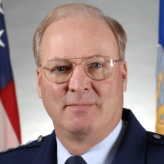Officials
Back to Officials


Offical

Name: McKinley, Craig
Current Position: Former Chief
General Craig R. McKinley has served as chief of the National Guard since November 2008, and in the process became the first four-star general in history to command the Guard.
McKinley received his commission as a second lieutenant in 1974 as a graduate of the ROTC program at Southern Methodist University, where he earned a bachelor’s degree in business administration.
He spent his first year in the U.S. Air Force at Moody Air Force Base in Georgia studying to be a pilot. After completing this training in November 1975, he became a T-38 instructor pilot at Craig AFB in Alabama.
From March 1977 to May 1979, he was the equal opportunity and treatment officer at the Air Force Military Training Center, Lackland AFB, in Texas. During this time he was promoted to first lieutenant. He also received an M.S. degree from Webster College in 1979.
He went back to being a T-38 instructor pilot while at Laughlin, before spending six years as an F-106 alert pilot with the 125th Fighter Interceptor Group in Jacksonville, Florida. There, McKinley also served as chief of safety, an F-16 instructor pilot, chief of standardization and evaluation, deputy commander for operations and commander of the 125th Fighter Wing. He rose in rank during this period from captain to major to lieutenant colonel to colonel.
From May 1994 to June 1995, McKinley attended the National War College at Fort Lesley J. McNair in Washington, DC. He then went back to commanding 125th Fighter Wing, until becoming the Air National Guard vice commander for the Southeast Air Defense Sector, stationed at Tyndall AFB in Florida.
In January 1998, he made brigadier general and served as deputy director of the Air National Guard and commander of the Air National Guard Readiness Center at Andrews AFB in Maryland.
From March 2001 to July 2002, McKinley was deputy inspector general of the Air Force, during which time he was promoted to major general.
He commanded the 1st Air Force, Air Combat Command, and was commander of the Continental U.S. North American Aerospace Defense Command Region (NORAD) at Tyndall AFB from August 2002 to October 2004.
Unfortunately for McKinley, his tenure at NORAD coincided with the 9/11 Commission’s hearings into the terrorist attacks of September 11, 2001. McKinley was put in the awkward position of trying to explain why the U.S. Air Force was ineffective in countering the attacks. He conceded that NORAD did not track possible threats within the U.S., but was focused on bomber attacks from the east, which he referred to as “a Cold War vestige.”
He attempted to say that NORAD could not have been expected to prepare for an attack that used hijacked planes as weapons. However, commission member Richard Ben-Veniste pointed out to McKinley that in September 1994, a Cessna 150L had crashed into the White House lawn; that in August 1998, U.S. intelligence had identified a plot by unnamed Arabs to fly a plane into the World Trade Center; that the following month U.S. intelligence had warned that Osama bin Laden may have been planning to crash a weapons-laden plane into a U.S. airport; that in July 2001, when President Bush attended the G-8 summit in Genoa, Italy, surface-to-air missiles were deployed to prevent an air attack; and that as early as 1996, when the Olympics were held in Atlanta, the U.S. government, as part of its security planning, prepared for the possibility that terrorists might fly an airplane into the main stadium. Ben-Veniste concluded his summary by asking McKinley, “Was not this information, sir, available to NORAD as of September 11th, 2001?” McKinley replied, “It's obvious by your categorization that those events all took place and that NORAD had that information.”
After his public grilling, McKinley returned to the military cocoon. He completed his NORAD service and was next sent to Germany to serve as director of the Mobilization and Reserve Affairs Directorate, U.S. European Command, in Stuttgart-Vaihingen for one year.
From November 2005 to May 2006, McKinley was assistant deputy chief of staff for plans and programs at Air Force headquarters in Washington, DC.
He was then promoted to lieutenant general and served as director of the Air National Guard in Arlington, Virginia.
McKinley became general and chief of the National Guard Bureau in November 2008.
McKinley has logged more than 4,000 hours as a pilot, primarily in the T-38, F-106, F-16 and F-15. Additionally, he has been a pilot in command in the C-131 and C-130 operational support airlift aircraft.
McKinley and his wife, Cheryl, have a son, Patrick, and a daughter, Christina.
General Craig R. McKinley (National Guard)
Gen. Craig R. McKinley (WhoRunsGov, Washington Post)
- Latest News
- D.C. Public Schools will Teach all Second-Graders to Ride a Bike
- New Rule in Germany Limits Sales of Sex-Themed E-Books to 10pm to 6am
- What Happened to the 6-Year-Old Tibetan Boy the Chinese Government Kidnapped 20 Years Ago?
- U.S. Ambassador to Turkey Photoshops his Hair Color to Mock Turkish Mayor
- Mystery Artist Calls Attention to Unfixed Potholes by Drawing Penises around Them




